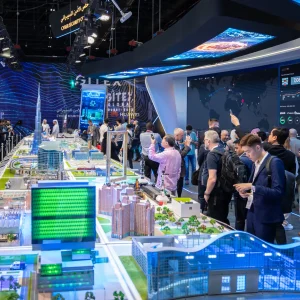The United Arab Emirates (UAE) is set for significant economic growth this year, thanks to the strong performance of its non-oil sectors. While the country has long been associated with oil exports, industries like real estate, tourism, and finance are now leading the charge, driving the economy to new heights.
Real Estate Boom Continues
One of the major contributors to the UAE’s non-oil economic surge is its thriving real estate sector. Cities like Dubai and Abu Dhabi are witnessing a construction frenzy, with luxury apartments, commercial towers, and mixed-use developments popping up rapidly. International investors, drawn by attractive returns and stable regulations, are pouring money into the property market.
Developments such as Dubai’s iconic waterfront properties and Abu Dhabi’s sustainable urban projects are gaining global attention. Additionally, government initiatives like long-term visas for property investors are further boosting confidence in the sector. The UAE’s decision to grant Golden Visas to investors and entrepreneurs has played a key role in encouraging long-term commitment from foreign nationals.

Real estate developers are also introducing innovative projects focusing on sustainability and smart city solutions. With energy-efficient buildings, AI-powered management systems, and green spaces, these developments contribute to both environmental goals and economic growth. Real estate consultancy firms are predicting continued price appreciation in key areas, further strengthening the market’s appeal.
Tourism: A Growing Powerhouse

Tourism has become another pillar of the UAE’s non-oil economy. From hosting world-class events like Expo 2020 to offering luxury experiences in hotels and resorts, the country has solidified its position as a top global destination.

Dubai alone welcomed over 17 million tourists in the past year, with numbers expected to rise further. New attractions like Museum of the Future and Ain Dubai, along with cultural hubs in Sharjah and Ras Al Khaimah, are diversifying the tourism landscape. Visitors are increasingly drawn to the UAE’s blend of futuristic experiences and traditional Emirati heritage.
The hospitality sector is also flourishing. Luxury hotel chains, desert resorts, and heritage stays are capitalizing on the influx of travelers, leading to increased employment opportunities and economic activity. In addition, the government is focusing on promoting eco-tourism initiatives, encouraging visitors to explore natural reserves, mangroves, and wildlife sanctuaries.
The aviation industry plays a critical role in supporting tourism. Emirates and Etihad Airways have expanded their global networks, offering seamless travel experiences for tourists. With ongoing airport expansions, including Dubai International Airport and Al Maktoum International Airport, the UAE is well-positioned to accommodate the growing influx of visitors.
Finance and Trade Drive Prosperity
The UAE’s financial sector is another vital growth engine. Dubai International Financial Centre (DIFC) and Abu Dhabi Global Market (ADGM) have become financial powerhouses, attracting global institutions and fintech startups. These hubs offer robust regulatory frameworks, tax incentives, and access to regional and international markets.

The government has also introduced pro-business reforms, streamlined regulations, and encouraged foreign direct investments. As a result, the UAE has emerged as a leading financial hub in the region. Additionally, the country’s vibrant fintech ecosystem has accelerated digital payment solutions, blockchain applications, and financial inclusion efforts.
Trade remains a robust sector. The country’s strategic location and world-class infrastructure make it an essential gateway for global trade. Ports like Jebel Ali and Khalifa Port handle millions of containers annually, strengthening the UAE’s position in global logistics. With its modern free zones and trade agreements, the UAE remains a preferred destination for import and export activities.
E-commerce is also seeing a sharp rise, with platforms like Noon and Amazon UAE expanding their operations. Government-backed digital transformation initiatives are further enhancing logistics and cross-border trade, contributing to the nation’s overall economic growth.
Government Initiatives and Vision
The UAE leadership’s vision for a diversified economy is evident in its ambitious projects. Initiatives like the “We the UAE 2031” vision aim to double the country’s non-oil GDP, focusing on sectors like green energy, digital technology, and space exploration.
The recently announced corporate tax regime, set at a competitive rate, is also expected to attract further investments. Additionally, free zones and golden visa programs continue to position the UAE as a prime business destination. The government is also investing heavily in education and upskilling initiatives to create a highly skilled workforce that can drive innovation and productivity.
Infrastructure investments are another key area of focus. Projects like the Etihad Rail, which will connect key cities across the UAE, will not only facilitate trade but also boost domestic tourism and regional connectivity. Sustainable energy projects, including solar and nuclear power plants, are further positioning the UAE as a leader in clean energy adoption.
Looking Ahead
Economists predict that the UAE’s non-oil economy will maintain its upward trajectory throughout the year. Strong infrastructure development, increased foreign investments, and government-backed initiatives will likely sustain growth.
For residents and investors, this means more opportunities, whether it’s in the real estate market, starting a business, or exploring employment prospects. The rise of startup incubators and accelerators also makes the UAE an attractive location for entrepreneurs in emerging sectors like fintech, healthtech, and renewable energy.
As the UAE strengthens its non-oil sectors, it further establishes itself as a resilient and future-ready economy. With a clear focus on sustainability, digital transformation, and global connectivity, the country is well-positioned for long-term prosperity. Whether you’re a business owner, a tourist, or a resident, there’s no doubt that the UAE’s economic rise will bring countless opportunities in the years to come.
Also read: Why the UAE’s Reaction to the Niger Mosque Attack Matters












